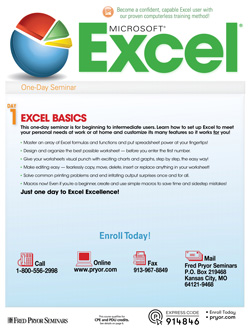Why Excel Skills Are Important in the Job Market
If you are looking for a job, or hoping to move to a better one, you’re probably doing all the right things: Networking, updating your social presence on LinkedIn, honing your resume. But are you also improving your skills? And in particular, are your Excel skills where they need to be?
If you’re thinking, “but I don’t do finance” or “I’m not a data analyst” and therefore don’t need Excel, think differently! Excel is not only the most popular spreadsheet, Excel competence is among the most transferrable skills in the job market.
Are Excel Skills in Demand?
Let’s answer the question in an interesting way. Here is a list of most-valued-by-employer skills[1] as reported by Indeed.com, one of the largest job search sites:
- Communication Skills
- Teamwork Skills
- Interpersonal Skills
- Learning/Adaptability Skills
- Self-management Skills
- Organizational Skills
- Computer Skills
- Problem-solving Skills
- Open-mindedness
- Strong Work Ethic
- Leadership Skills
Clearly, being able to check off Excel competence as a “Computer Skill” ticks this employer priority. But if you look a little closer, Excel can also improve your performance and appeal in several of the other priorities, too.
- Communication Skills – Being an effective communicator means not just sharing information but doing so in a way that avoids confusion and supports your ideas. Excel is useful for organizing data for understanding, then analyzing that data into charts or graphs that communicate and persuade. Imagine justifying expenses to a supervisor with a line graph that categorizes spending and shows inflation trendlines instead of handing over a pile of invoices.
- Teamwork Skills – Working as a team towards shared goals can be much easier if everyone ON the team is using the same data. Imagine being the employee who develops a shared spreadsheet that tracks all clients and when they were contacted so that the team can stay on top of accounts without pestering contacts.
- Self-management Skills & Organizational Skills – Organization is critical to productivity. Every moment spent repeating tasks or looking up information you’ve looked up before is a moment that you could be spending on the valuable tasks of your job – whatever that might be. Spreadsheets save you time by performing repetitive calculations easily, helping you prioritize and collect data into a central location and format. Imagine a spreadsheet that automatically calculates your spending and spits out a reimbursement form each month in the proper format.
- Problem Solving Skills – Not all problems require data analysis to solve, of course. But when they do, having Excel skills at your fingertips to understand trends, spot patterns or organize priorities can save you time and impress the boss. Imagine being the employee who notices that sales calls made on Wednesdays were more likely to close than calls made on Fridays.
- Leadership Skills – Successful leadership is a combination of all of the above: communication, teamwork, organization, problem-solving. Having the tools in your toolbox that enhance all your work product sets you up for more respect and responsibility.
So, while “Excel skills” might not appear on this list literally, taking the time to invest in Excel can be an investment in the soft skills employers are most looking for.
SAVE $10 AND TRAIN ON THIS TOPIC TODAY
Who Needs Excel Skills?
Who needs Excel skills? If you’re asking in the hope that you’re off the hook, then you’re going to be disappointed. Let’s answer the question at face value. Here is a list of job definitions and how Excel can be a valuable tool in performing these tasks:
- Finance & Accounting – This one is obvious. Financial services and accounting use Excel heavily in day-to-day tasks and benefit from Excel skills the most. You will likely have specific, advanced training on using Excel to perform this job.
- Marketing – Also fairly obvious. Marketing professionals manage budgets and analyze market data to decide what products are going to make money. But marketers also take advantage Excel for non-financial tasks such as determining which ad campaigns customers responded to or which products generate the most customer complaints. Polls and Survey results that flow into Excel can be more easily sorted and analyzed.
- Administration – Many day-to-day administrative tasks can be facilitated by Excel. Perhaps you are required to log all calls you answer on behalf of a boss or keep track of office supply inventories. Day-to-day financial tasks such as check requests can become Excel templates that make it easy for anyone to use.
- Educators – Even teachers can make their lives easier by engaging with Excel. Tracking and calculating grades, attendance tracking, lesson planning and common administrative tasks are all valuable Excel skills.
The answer to “Who needs Excel skills?” is “Anyone who performs a job that requires organization and analysis.” I’m sure there are some out there that don’t…but that list will be far far shorter than jobs that collect some form of information and get insight from that information.
How Can I Improve My Excel Skills?
Now that you’re convinced that investing in yourself by honing your Excel skills is important to getting that new job you are looking for, how do you do it?
Fred Pryor Seminars offers several ways to help depending on your preferred learning style and the time you have available. Live Online Seminars provide concentrated sessions with a live instructor. Webinars offer you bite size introductions to important tasks, and our library of LMS Online courses allow you to devise your own training regimen to build exactly the skills you need.
[1] https://www.indeed.com/career-advice/resumes-cover-letters/skills-employers-look-for


